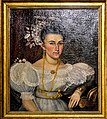Alexander G. McNutt | |
|---|---|
 | |
| 12th Governor of Mississippi | |
| In office January 8, 1838 – January 10, 1842 | |
| Preceded by | Charles Lynch |
| Succeeded by | Tilghman Tucker |
| Member of the Mississippi Senate | |
| In office 1835 | |
| Personal details | |
| Born | January 3, 1802 Rockbridge County, Virginia |
| Died | October 22, 1848 (aged 46) DeSoto County, Mississippi |
| Political party | Democratic |
| Alma mater | Washington and Lee University |
Alexander Gallatin McNutt (January 3, 1802 – October 22, 1848) was a Mississippi attorney and politician who served as Governor from 1838 to 1842.
Early life
[edit]Alexander G. McNutt was born into an aristocratic landowning family in Rockbridge County, Virginia on January 3, 1802. He graduated from Washington College (now Washington and Lee University) in 1821, studied law, and moved to Jackson, Mississippi in the early 1820s. He subsequently relocated to Vicksburg, where he practiced in partnership with Joel Cameron. When Cameron was murdered by his slaves in 1833, McNutt subsequently married Cameron's widow, Elizabeth Lewis Cameron. (Before the slaves were executed, a free black man who was also implicated blamed McNutt for the murder, stating that McNutt had instigated it in order to profit by Cameron's death.)[1][2][3]
Political career
[edit]A Democrat, in 1829 he served as a Selectman in Vicksburg. In 1835 McNutt was elected to the Mississippi State Senate. In 1837 he was elected President of the Senate.[4][5]
McNutt ran successfully for governor in 1837 and in 1839, serving two terms from 1838 to 1842. During his term Mississippi founded its state library and procured land for construction of a state university, and construction was completed on the state penitentiary.[6] The northern boundary with the State of Tennessee was resurveyed, but the new boundary did not result in more territory for Mississippi and the new city of Memphis proved to outside the bounds of the survey which had been an aim for some of the advocates of the resurvey.[7]
During his governorship, McNutt opposed central banking, including Mississippi's Planters and Union Banks, in which the state had large ownership stakes, arguing that the stockholders and managers were corrupt. The banks sold bonds in an effort to raise revenue, which the state repudiated under McNutt's influence, leaving the state with a large debt.[8]
After leaving office he resumed practicing law. In 1847 he ran unsuccessfully for the United States Senate, losing to Henry S. Foote.[9]
In 1848, McNutt campaigned for the presidential ticket headed by Lewis Cass and was a candidate for presidential elector. While in Desoto County, he became ill and died on October 22, 1848. He was buried in Greenwood Cemetery in Jackson, Section 6, Lot 57.[10][11]
Legacy
[edit]McNutt's home is a Vicksburg landmark and listed on the National Register of Historic Places.[12] The community of McNutt, Mississippi is named in honor of McNutt.[13]
Gallery
[edit]-
McNutt's house in Vicksburg
-
Burial site in Greenwood Cemetery, Jackson
-
Painting of Elizabeth McNutt on display at the Old Warren County Courthouse
References
[edit]- ^ Robert Lowry, William H. McCardle, A History of Mississippi, 1891, page 279
- ^ Mark Twain, Mark Twain's Notebooks & Journals, Volume I: (1855-1873), page 138
- ^ Studies in American Humor, Studies in American Humor, Volume 3, 1984, page 113
- ^ James Knox Polk, author, Wayne Cutler, Herbert Weave, editors, Correspondence of James K. Polk, Volume 7, 1989, page 14
- ^ Mississippi State Legislature, Laws of the State of Mississippi, 1838, page 33
- ^ Nancy Capace, Encyclopedia of Mississippi, 2001, pages 112-113
- ^ Franklin L. Riley. (1905). School history of Mississippi for use in public and private schools. pp. 192f.
- ^ Mississippi Department of Archives and History, The Official and Statistical Register of the State of Mississippi, Biographies of the Governors: Alexander G. McNutt, 1912, pages 59-60
- ^ Jefferson Davis, The Papers of Jefferson Davis: June 1841-July 1846, 1975, pages 215-216
- ^ James T. White & Company, The National Cyclopedia of American Biography, Volume XIII, 1906, pages 487-488
- ^ Greenwood Cemetery, Jackson, Mississippi, Greenwood Cemetery: Notable Burials, retrieved April 20, 2014
- ^ The McNutt House, bout the McNutt House, retrieved April 20, 2014
- ^ "McNutt Historical Marker". Historical Marker Database. Retrieved February 14, 2023.




